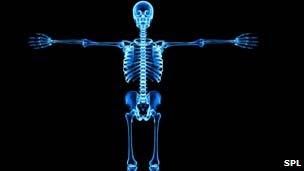Bone 'turnover' link to diabetes
- Published

The skeleton is under constant renewal as new bone is grown and old bone broken down
The skeleton has a key role in regulating blood sugar and may be the underlying cause of diabetes in some people, say US researchers.
A study in mice found that the breakdown of old bone to make way for new bone growth also helps to keep a healthy level of glucose in the blood.
A hormone called osteocalcin seems to be the link, it showed.
The Columbia team, writing in Cell, say the findings may lead to better drugs to help control Type 2 diabetes.
Study leader Dr Gerard Karsenty, from Columbia University Medical Center, had already done work showing osteocalcin, which is released by bone, can regulate glucose levels.
It switches on the production of insulin in the pancreas which in turn improves the ability of other cells to take in glucose from the blood.
But in the latest study, he found that osteocalcin only works when bone is being broken down during its natural turnover.
Further tests on osteocalcin and glucose levels in a small group of patients with a genetic defect in their bone turnover supported the initial findings in mice.
'Important implications'
Type 2 diabetes is the most common form of the condition and is caused when the body no longer properly responds to insulin leading to out of control blood sugar.
The results suggest that for some people, diabetes may be triggered by changes in the skeleton.
Also drugs designed to stimulate this link between bone and insulin may lead to better treatments for type 2 diabetes, he adds.
One important consequence of the finding is that bone-strengthening drugs used in conditions such as osteoporosis may interfere with this process and cause problems with blood sugar.
"This research has important implications for both diabetes and osteoporosis patients," he said.
"First, this research shows that osteocalcin is involved in diabetes onset
"Secondly, bone may become a new target in the treatment of type 2 diabetes as it appears to contribute strongly to glucose intolerance
"And finally, osteocalcin could become a treatment for type 2 diabetes."
Dr Victoria King, head of research at Diabetes UK, said: "The research is interesting and this area of investigation could open up the possibility of more targets for drugs to treat or prevent type 2 diabetes."
But she warned the research was in the very early stages.
"What we do know at this stage is that lifestyle changes such as maintaining a healthy weight, eating a balanced diet and being more physically active can help to reduce your risk of developing type 2 diabetes, and can also help people diagnosed with the condition to manage it more effectively."